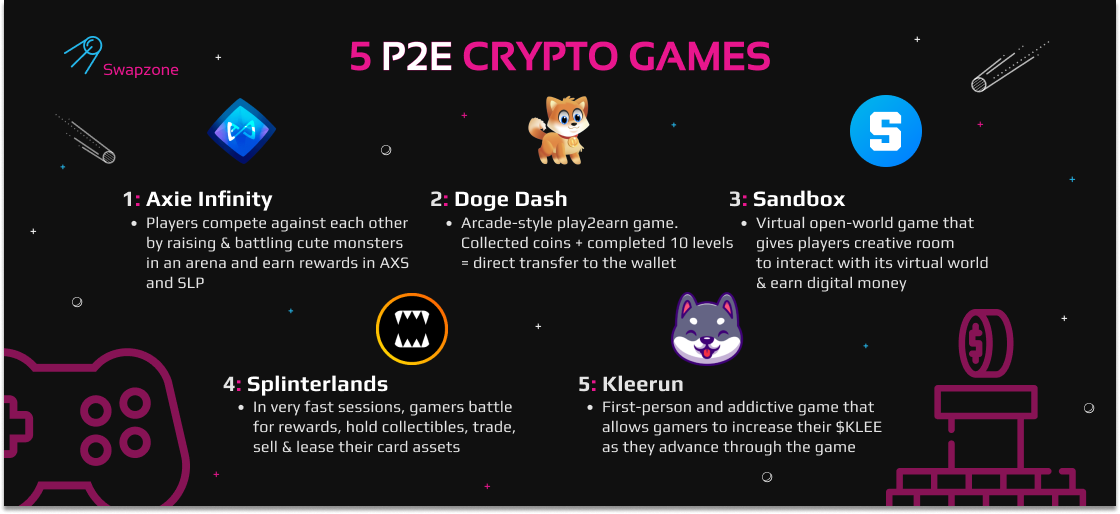Play to earn rewards and change your gaming hobby into a beneficial experience
Play to earn rewards and change your gaming hobby into a beneficial experience
Blog Article
How Play-to-Earn Incentives Are Changing the Gaming Experience
The arrival of Play-to-Earn incentives notes a considerable development in the pc gaming landscape, moving the emphasis from simple entertainment to real economic involvement. This transformation invites gamers to invest not just their time but likewise their funds, cultivating a sense of possession and much deeper interaction within video game communities. As varied demographics embrace these chances, brand-new communities arise, obscuring the lines between leisure and financial investment. This shift raises essential inquiries about sustainability and the future of video gaming. What effects could this have for the industry and its players?

Advancement of Gaming Designs
The landscape of gaming has undertaken a considerable makeover over the decades, developing from typical pay-to-play designs to a lot more ingenious frameworks that focus on user interaction and money making. Games were mainly offered as standalone products, needing in advance settlements for accessibility. This version, while effective in generating income, commonly minimal gamer communication and area structure.

In recent times, the surge of blockchain modern technology has actually introduced play-to-earn systems that fundamentally modify video gaming dynamics. These models not just supply a platform for gamers to make benefits but additionally democratize the gaming economic situation, enabling users to own in-game possessions. This development mirrors a wider trend in the direction of community-driven experiences, where designers and players team up in forming the video gaming landscape, inevitably redefining how worth is regarded in the pc gaming market.
Advantages of Play-to-Earn Equipments
Opening brand-new methods for player involvement, play-to-earn systems use a variety of advantages that essentially enhance the video gaming experience. These systems empower gamers by providing concrete rewards for their time and initiative, fostering a feeling of possession and investment in the video game. This intrinsic inspiration drives gamers to engage even more deeply, exploring game technicians and communities that they may or else neglect.
In addition, play-to-earn versions equalize gaming by leveling the playing area. Gamers from various histories can profit from their skills and creative thinking, enabling new participants to experience economic benefits that were typically scheduled for programmers and publishers. This shift motivates a much more varied gamer base, enriching the video gaming ecological community with diverse perspectives and experiences.
In addition, play-to-earn systems advertise community building, as players team up and complete within decentralized atmospheres. This interaction cultivates social connections that enhance satisfaction and retention, as players feel a feeling of belonging.
Lastly, these systems can lead to increased long life for video games, as continual player involvement often converts right into continual rate of interest and investment in future iterations or expansions, making certain a vivid video gaming landscape.
Economic Effect On Players
Play-to-earn systems not just improve player engagement yet additionally have considerable economic implications for people included. These platforms permit players to monetize their time and skills, changing video gaming from a pastime into a practical revenue resource. As players gain copyright or in-game possessions that can be traded or sold in real-world markets, they obtain monetary incentives that can dramatically affect their personal economic situations.
The economic version promotes a new age of entrepreneurship, as gamers can purchase numerous video sites gaming ecosystems or create techniques to maximize their incomes. This potential for revenue generation draws in a varied demographic, consisting of those in regions with minimal job chances - play to earn rewards. Consequently, lots of gamers are now watching gaming not equally as entertainment yet as a pathway to financial empowerment.
Nevertheless, it is important to acknowledge the volatility linked with cryptocurrencies and the potential for market changes to impact revenues. Players need to browse these risks while balancing their video gaming and economic tasks. Overall, the economic influence on gamers is extensive, reshaping their relationship with video gaming and opening up opportunities for wide range production in an increasingly digital economic climate.
Neighborhood Structure in P2E Gamings

Gamers in P2E settings regularly create guilds or partnerships, developing networks that facilitate resource sharing, strategic planning, and shared support. These groups typically participate in cooperative missions or competitions, further strengthening their bonds and enhancing the total pc gaming experience. In addition, community-driven occasions, such as competitions and social events, serve to unite gamers, foster sociability, and incentivize engagement.
Moreover, designers actively engage with their areas, incorporating comments and ideas that shape game growth. This collective method not only encourages gamers but also makes certain that video games develop abreast with gamer rate of interests, enhancing satisfaction and lasting interaction. Ultimately, area building in P2E video games is not simply a feature; it is a fundamental element that transforms the video gaming landscape into an extra inclusive and interactive setting.
Future Patterns in Gaming
The video gaming industry's advancement is poised to welcome several transformative fads that will redefine gamer interaction and experience. Among the most substantial patterns is the integration of expert system (AI) to develop more tailored gaming settings. AI can evaluate gamer behavior and choices, allowing programmers to tailor experiences that reverberate deeply with specific customers.
Moreover, the development of virtual and enhanced fact (VR/AR) innovations is readied to enhance immersion, supplying players the ability to communicate with digital worlds in unmatched means. This will certainly not just raise gameplay yet also foster social links, as look these up gamers can collaborate and contend in common settings.
Additionally, the rise of blockchain innovation will certainly proceed to influence the video gaming landscape, allowing real possession of in-game properties through non-fungible tokens (NFTs) This pattern will certainly encourage gamers to trade and monetize their pc gaming experiences, further blurring the lines between gaming and investment.
Final Thought
By integrating economic motivations right into gameplay, gamers are progressively engaged, fostering a feeling of possession and financial investment in digital settings. website here As these fads continue to develop, the blurred lines in between enjoyment and investment will likely redefine the future of gaming, forming new experiences for players worldwide.
Report this page